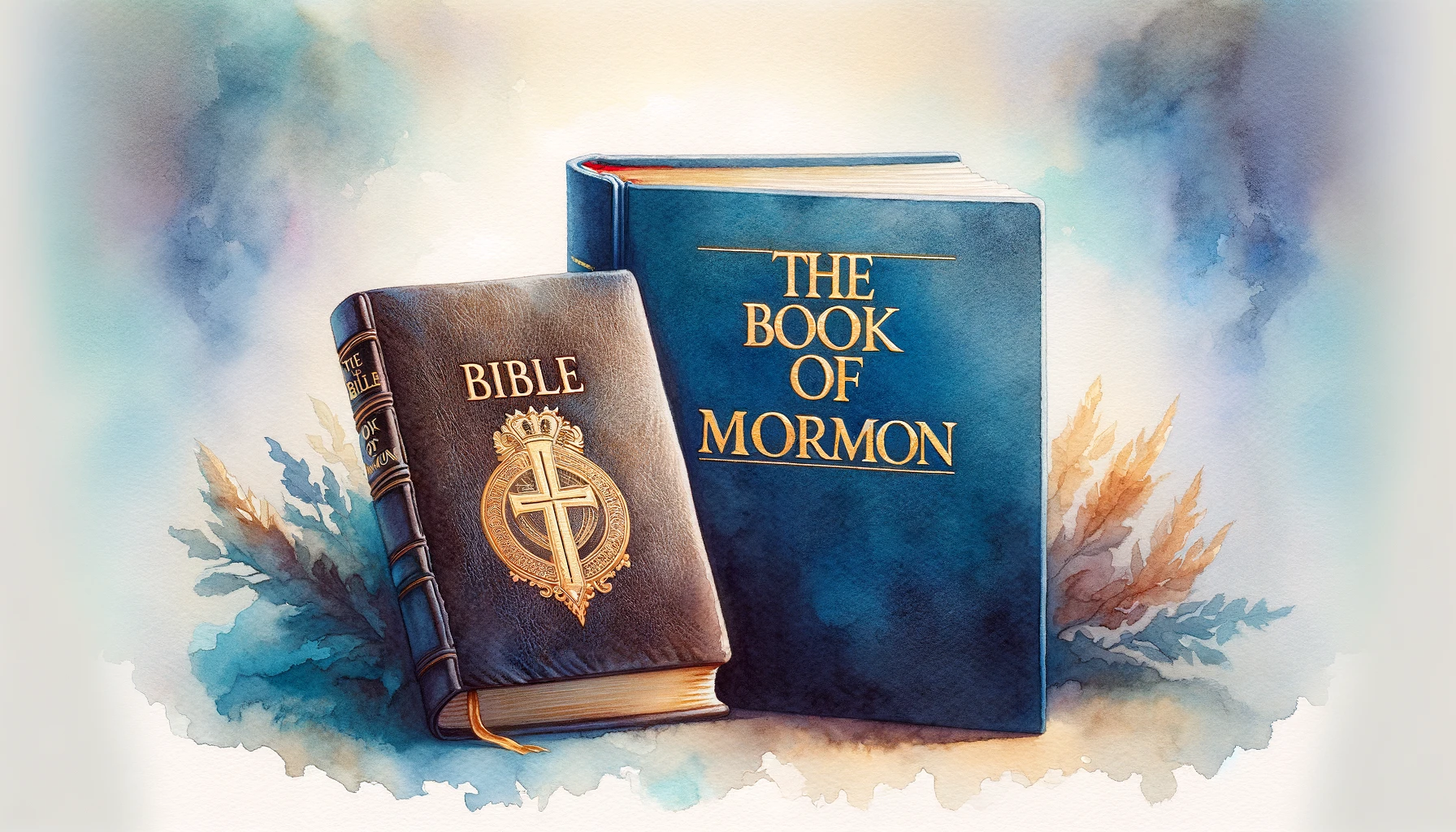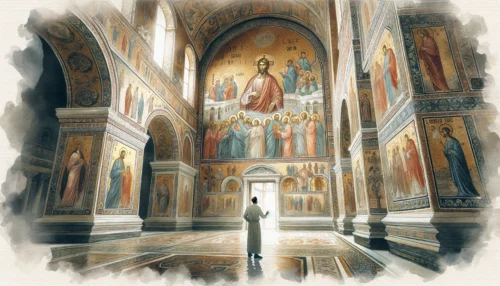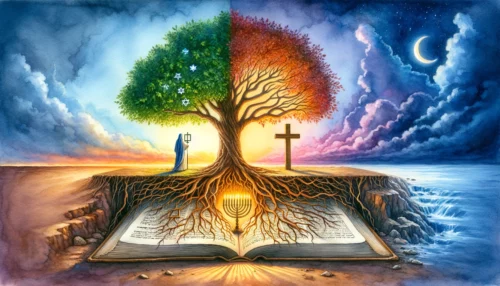In this exploration, we’ll seek to understand Mormonism’s core tenets and practices and compare them with those of mainstream Christianity. We’ll consider the foundation of Mormonism, its unique scriptures, and the characteristics that differentiate it from more widely accepted Christian denominations. This is not an attempt to incite division, but a pursuit of understanding, allowing us to better engage in meaningful dialogues about faith, belief, and spiritual kinship.
Understanding Mormonism: History and Key Beliefs
Mormonism, officially known as the Church of Jesus Christ of Latter-day Saints (LDS), was founded in the early 19th century by Joseph Smith. Smith was born in 1805 in Vermont, and as a teenager, he reported having a series of visions. Among the most significant of these was the vision in which he was directed by an angel named Moroni to a buried book of golden plates. These plates, Smith claimed, contained the religious history of an ancient American civilization. Smith translated the inscriptions on these plates into English, resulting in the Book of Mormon, which Mormons regard as another testament of Jesus Christ, supplementing the Bible (1 Nephi 13:40).
The Church of Jesus Christ of Latter-day Saints places great emphasis on the concept of continuous revelation. This belief holds that God continues to reveal divine wisdom and commandments to modern-day prophets, just as He did in biblical times. This doctrine is a key difference between Mormonism and traditional Christianity, which generally holds that divine revelation concluded with the New Testament (Hebrews 1:1-2).
Mormon theology also presents a distinct view of the Godhead. While Christians typically believe in the Trinity, meaning one God in three persons – Father, Son, and Holy Spirit – Mormons see these as three separate beings, unified in purpose but not in substance. In this way, the LDS Church diverges from the Christian concept of monotheism, where God is one in both essence and personhood (Deuteronomy 6:4).
Another unique belief in Mormonism is the concept of eternal progression. Mormons believe that individuals can progress eternally, becoming gods themselves in the afterlife. This stands in contrast with traditional Christian beliefs, which maintain that only God is divine, and humans, though created in His image, do not share His divine nature (Isaiah 43:10).
With this understanding of Mormonism’s history and key beliefs, we can see that while there are areas of overlap with Christianity, there are also significant differences. These differences lie not only in additional scriptures and historical narratives but also in fundamental understandings of God, revelation, and the nature of existence in the afterlife. It’s essential to acknowledge these distinctions as we seek to understand Mormonism in the context of Christianity.
Comparing Christian and Mormon Doctrines
A critical part of understanding the relationship between Mormonism and Christianity involves examining and comparing their respective doctrines. To start, we can consider the central role of Jesus Christ in both faith traditions. Both Christians and Mormons believe in Jesus Christ as the Savior of the world and affirm His birth, death, and resurrection. Yet, the nature of Christ’s divinity is understood differently. In Christianity, Jesus is part of the Trinity, consubstantial with the Father and the Spirit (John 10:30). Mormons, as mentioned earlier, see Jesus as a separate entity from God the Father, though still divine.
The nature and identity of God are also areas of divergence between the two. As previously noted, Christianity teaches monotheism, affirming that there is only one God who exists in three persons – the Father, the Son, and the Holy Spirit (Deuteronomy 6:4; Matthew 28:19). In contrast, Mormonism posits that God the Father, Jesus Christ, and the Holy Spirit are separate beings.
Scripture, as the revealed word of God, holds a foundational place in both traditions. Christians uphold the Old and New Testaments of the Bible as their primary sacred texts. For Mormons, the Bible is also regarded as scripture, but it is read alongside other texts, including the Book of Mormon, Doctrine and Covenants, and Pearl of Great Price. The Book of Mormon, in particular, is seen as another testament of Jesus Christ and is thought to complement and clarify the biblical narrative.
Salvation and the afterlife are other important doctrinal areas. Traditional Christian belief holds that salvation is by grace through faith in Jesus Christ, not by human efforts or good deeds (Ephesians 2:8-9). Mormons also believe in salvation through Christ, but they emphasize the necessity of good works and ordinances, such as baptism and temple rituals. Concerning the afterlife, Christianity generally teaches the existence of heaven and hell. Mormonism, on the other hand, proposes a more complex view with multiple degrees of glory in the afterlife, where individuals can progress towards godhood.
In looking closely at these areas – the nature of Jesus Christ, the identity of God, the role of scripture, and beliefs about salvation and the afterlife – we can see both similarities and differences between Christian and Mormon doctrines. While both share a belief in Jesus Christ as Savior and regard scripture as divine revelation, their understandings of these elements differ in significant ways. The divergences in the doctrines of God, salvation, and the afterlife are particularly notable. These comparisons give us a clearer picture of how Mormonism aligns and diverges from traditional Christian belief.
Evaluating the Cult Question: A Biblical Perspective
A common query in discussions about Mormonism’s relationship to Christianity involves whether Mormonism should be classified as a cult. The term “cult” often carries negative connotations in modern usage, but for our purposes, let’s consider a more neutral definition: a religious group that, while claiming to be part of or related to a larger religious tradition, holds beliefs or practices that significantly deviate from those of the larger tradition.
One key principle in Christianity is the belief in one God who exists as Father, Son, and Holy Spirit – a concept known as the Trinity (Matthew 28:19). As we’ve discussed, Mormonism distinguishes between these three, viewing them as separate beings. This divergence from traditional Christian belief about the nature of God is one of the key differences that has led some to label Mormonism as a cult.
The concept of salvation is another key differentiator. Christianity traditionally holds that salvation comes through faith in Jesus Christ, not by works or personal merit (Ephesians 2:8-9). In contrast, Mormonism, while affirming the role of Christ in salvation, also emphasizes the importance of good works and adhering to church ordinances. This difference, combined with the distinct Mormon belief in the possibility of achieving godhood in the afterlife, marks another significant departure from traditional Christian beliefs.
We also can’t overlook the role of the Bible. For Christians, the Bible is considered the authoritative Word of God, and any new teachings or revelations are tested against its truths (2 Timothy 3:16-17). Mormonism’s belief in continuing revelation through prophets and the addition of other scriptures like the Book of Mormon is a significant deviation from this principle.
Evaluating Mormonism from a biblical perspective, we can see areas where it significantly diverges from traditional Christian beliefs – the nature of God, the concept of salvation, and the authority and role of the Bible. These divergences, central to the faith, are often what lead observers to classify Mormonism as a cult according to the definition we’ve used. While the term “cult” is loaded and can foster division, it’s clear that important differences exist between Mormonism and mainstream Christianity. Understanding these differences helps us to comprehend why this question arises and encourages us to continue seeking a fuller understanding of our faith and that of others.
Nurturing Bridges of Understanding
As we have journeyed through the origins, key beliefs, and doctrines of Mormonism, and compared them with traditional Christian beliefs, it is clear that while there are areas of overlap, significant differences also exist. These differences, particularly in the nature of God, the understanding of salvation, and the concept of revelation, form the basis for much of the debate on whether Mormonism falls within the umbrella of Christianity or stands outside of it.
To further reflect on this topic, consider the following questions:
- How can acknowledging the differences in doctrines lead to more meaningful dialogues about faith?
- How might our understanding of other belief systems, such as Mormonism, influence our approach to interfaith conversations?
- What can we learn from Mormonism’s emphasis on community and family values?
In our quest for understanding, let us never lose sight of the unwavering foundation of our Christian faith. Let us remember that the truth of God is firm and unwavering. It is in Him that we find our guidance and our strength. As we navigate the complexities of different beliefs, let us cling to the core of our faith – the redeeming love of Jesus Christ, His saving grace, and the truth of His word.














